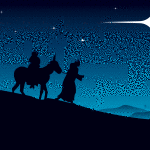There’s a well known problem with Luke’s nativity. Luke states that Mary and Joseph went to Bethlehem because of a census that took place while Quirinius was governor of Syria (2:1-5).
In those days a decree went out from Caesar Augustus that all the world should be registered. This was the first registration when Quirinius was governor of Syria. And all went to be registered, each to his own town.
Now Josephus, the first century historian, says Quirinius conducted a census in A.D. 6. And here in lies the problem. Because Luke, like Matthew, also places Jesus birth before the death of King Herod in 4 B.C (Matt. 2:1, Luke 1:5). Which adds up to unmistakable difference of 9 years.
Whatever the solution to this problem, and there are good solutions, It appears to me that Luke did indeed want his readers to at least connect Jesus’ birth with the memory of the census of A.D. 6. Here’s why.
The census that year sparked a major Jewish revolt. Luke knows of this event because he refers to it in his second volume (Acts 5:37).
After this Judas the Galilean rose up in the days of the census and drew away some of the people after him. He too perished, and all who followed him were scattered.
It’s quite natural to connect this census with the one already mentioned at the beginning of Luke.
Concerning Judas, Josephus in his Antiquities of the Jews provides a little more.
Yet was there one Judas, a Gaulonite, of a city whose name was Gamala, who, taking with him Sadduc, a Pharisee, became zealous to draw them to a revolt, who both said that this taxation was no better than an introduction to slavery, and exhorted the nation to assert their liberty; as if they could procure them happiness and security for what they possessed, and an assured enjoyment of a still greater good, which was that of the honor and glory they would thereby acquire for magnanimity.
The result, however, was vastly different than Judas intended. Rome quickly crushed the rebellion. But the repercussions, Josephus finds, extended long after.
the sedition at last increased so high, that the very temple of God was burnt down by their enemies’ fire. (A.D. 70)
It appears to me that Luke implicitly compare and contrast the well-known actions of the Rebel Judas with the actions of Mary and Joseph. Like Judas, Mary and Joseph are from Galilee. And yet unlike the revolutionary they don’t rebel when commanded to register. They humbly obey.
And Joseph also went up from Galilee, from the town of Nazareth to Judea, to the city of David, which is called Bethlehem, because he was of the house and lineage of David, to be registered with Mary, his betrothed, who was with child. And while they were there, the time came for her to give birth. And she gave birth to her firstborn son and wrapped him in swaddling cloths and laid him in a manger, because there was no place for them in the inn.
If anyone had a reason to rebel, they did. Mary with child, a long distance to travel and no room for them when they arrive. But suffering the insults, they conducted themselves as Rome, the oppressor state, required.
Luke in both his Gospel and Acts is insistent on the peaceful behavior of Jesus and his followers. Despite Jesus being executed as an enemy of Rome, and His followers being the source of numerous riots, Luke stresses over and over again that the seditious overthrow of the government is not the way of those who follow Christ.
Instead Jesus comes, as Zachariah says,
to guide our feet in the way of peace (Luke 1:79).
And it is because of His birth the angels sing,
Glory to God in the highest, and on earth peace among those with whom he is pleased! (Luke 2:14)
By implicitly comparing and contrasting Mary and Joseph’s behavior with the infamous actions of Judas the Galilean, Luke offers them as examples of peace for all Christians to follow.























